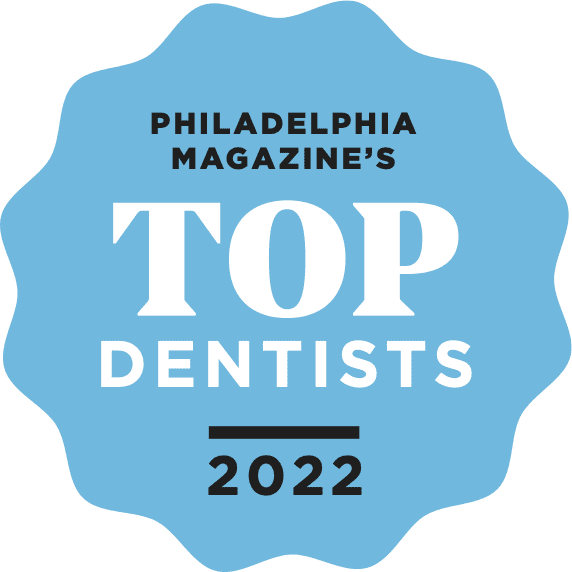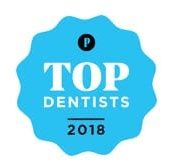Do you suffer from frequent headaches? Does your jaw hurt, click or feel tired?
Treating TMJ in Philadelphia, PA
The temporomandibular joint (TMJ) connects your jaw to your skull. When pain or tension develops in this area, it can be due to a TMJ disorder (TMD). Many people in the U.S. are diagnosed with TMJ problems each year. If left untreated, it can cause serious damage to the joint, teeth, and surrounding tissues.
In some cases, lifestyle changes and relaxation techniques can help ease TMJ pain by reducing tension in the jaw muscles. Simple exercises for the jaw and neck can also be useful.
However, if the pain doesn’t go away, it’s important to see Dr. Shulman to prevent further problems or permanent damage. Dr. Drew Shulman is a leading restorative dentist in Northeast Philadelphia who has extensive experience in treating TMJ symptoms.

Some signs that you may have TMJ include:
- Chronic headaches
- Fatigue
- Jaw pain
- Neck pain
- Worn teeth
- Teeth clenching or grinding
- Frequent earaches
- Jaw popping or clicking
- Difficulty chewing
- Pain in the back or shoulders
Do You Need a Bite Analysis?
People with TMJ often have a misaligned bite, also known as malocclusion. If left untreated, this can lead to facial pain and tooth wear. Dr. Shulman can perform a bite analysis to check for problems with your bite.
A bite analysis measures the timing and force of your bite to see if it’s unbalanced. This helps find the cause of TMJ or bite problems for better long-term results.
What Causes TMJ?
TMJ happens when the hinge joint in your jaw doesn’t work properly. It can be damaged by an injury, or the cartilage that helps the joint move smoothly may wear down. A small disc in the joint acts as a cushion, and if it gets damaged or moves out of place, it can cause TMJ problems.
There are many causes of TMJ, so sometimes it’s hard to find the exact reason. Certain types of arthritis and connective tissue diseases make it more likely for the joint to wear down. Jaw injuries can also knock the joint out of place. Stress that leads to clenching or grinding your teeth is another common cause of TMJ.
How to Treat Temporomandibular Joint Disorders
Oral appliances, also known as splints, can effectively treat TMJ disorders. Dr. Shulman uses NTI-tss Plus™ technology for TMJ treatment. This is a small oral device that fits over your front teeth and is worn while you sleep. It can be worn on either the upper or lower teeth.
The NTI-tss Plus™ is made from safe, non-toxic material and does not contain harmful chemicals like Bisphenol A. This appliance helps reduce jaw pain and protects against teeth grinding and clenching caused by TMJ.
The NTI-tss Plus™ is smaller and less bulky than other oral appliances. It also reduces muscle contractions in the face and head, which can help with headaches and migraines. The device prevents your back teeth from touching, which reduces clenching.
In a clinical study, 82% of users of the NTI-tss saw a 77% reduction in migraine episodes, with no medical side effects.
TMJ Treatment FAQs
Do I need surgery to get rid of TMJ?
Most people don’t need surgery to fix TMJ. Surgery is only for severe cases or jaw issues that can’t be treated another way. Dr. Shulman offers other treatments for mild to moderate TMJ, like physical therapy, stress relief techniques, bite guards, or medicines to ease pain and swelling. Simple changes to your diet or jaw exercises can also help.
If these options don’t work after some time, you might talk to Dr. Shulman about surgery. He can explain the pros and cons of surgery and suggest a local oral surgeon for more serious cases.
Each TMJ case is different, so it’s important to talk with your dentist about what works best for you.
Will a TMJ Disorder go away on its own?
It might, but there’s no way to know for sure. If your TMJ issue is minor, it could go away on its own. But if you’ve had pain for a while, it’s unlikely to go away without help from a dentist.
Sometimes, TMJ symptoms improve with time if you manage stress, make lifestyle changes, or use self-care methods. Simple things like warm compresses, relaxation techniques, or light jaw exercises can also provide relief.
However, if your symptoms stick around or get worse, it’s important to see a dentist for treatment. While some cases may get better on their own, others need more attention to fix the problem.
How do I relieve TMJ symptoms at home?
You can do a few things at home to ease TMJ pain. Use an ice pack on your jaw, take anti-inflammatory medicines like ibuprofen, and try jaw exercises. But it’s still important to visit us for a proper check-up and advice on the best treatments for you.
Adding gentle jaw exercises to your routine can help reduce tension and improve movement. Warm compresses or ice packs can also soothe pain and reduce swelling. Stick to soft foods that don’t require too much chewing while your jaw heals.
Stress-reduction techniques like meditation or yoga can help too. Stress often makes jaw tension worse, so finding ways to relax can help you manage TMJ pain better.
Are there specific activities or habits that can make TMJ worse?
Certain habits or activities can make TMJ pain worse. Grinding your teeth at night or during stressful times puts extra strain on your jaw, making the pain worse. Clenching your jaw during the day can do the same, so it’s helpful to practice relaxing your jaw and paying attention to how it feels.
Chewing gum or eating tough foods can also add to the strain on your jaw. Try eating softer foods to give your jaw a break.
Bad posture, especially when sitting at a desk or looking at screens, can affect your jaw and add to tension in your neck and shoulders. Keeping good posture can ease some of the pressure on your body.
Talking too much or yelling can also make TMJ pain worse. If you need to talk for long periods, take breaks to rest your jaw and relax your face muscles.
By noticing these habits and making small changes, you can better manage your TMJ symptoms and take care of your overall well-being.
Request A Dental Exam Today
Dr. Shulman offers dental care for all ages in Northeast Philadelphia, PA. If you want to reduce jaw pain or stop teeth grinding, contact our office today. Call Dr. Shulman at (215) 372-1142 for professional care that can help ease your pain and improve your oral health.






